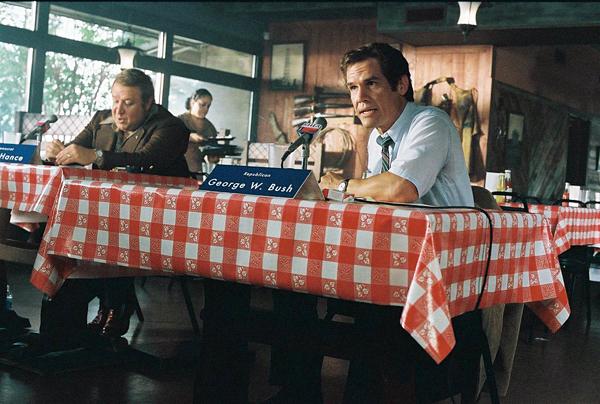
Rushed into cinematic release in time for the end of the Bush presidency, Stone’s film adds to the interpretation of our now former president by focusing on his dramatic character. Stone thinks of himself as a dramatist, and though we might prefer the omniscient perspective of an objective documentary, his film is more interested in perpetuating familiar storylines and anecdotes than providing any kind of full-sweeping analysis.
Many of these anecdotes occur outside of the White House, resorting to the Bush biography stereotypes that we know so well. This means we get a whole lot of Bush the drunk, Bush the hapless politician, and Bush the lucky son of a former president who rode coattails to the top. This is all before he becomes president, where the real problems (Iraq) finally happen.
The problem with Stone’s version of a Bush film is he never chooses an overarching angle or aspect of Bush to focus on. The lack of transparency in the Administration causes a certain amount of uncertainty, so we end up getting dialogue that uses anecdotes and one-liners that are already quite familiar to the public (think “misunderestimate”). Seeing this kind of writing on “Saturday Night Live” usually brings laughs. Here, it feels out of context, and in a film where Stone does not want to exaggerate any aspect of Bush, context should matter.
Perhaps this occurs because the film divides itself rather arbitrarily between three different stages of Bush’s life. There is the frat-boy, beer-guzzling Yale undergrad; the married Bush still in the shadow of his family’s politics; and the unprepared commander-in-chief heading into Iraq. Stone presents Bush as a simple-minded guy over the span of three very different periods, which just isn’t very interesting. Its subject matter is controversial, but the execution is not.
Individual performances improve the film, but they only go so far. Brolin is so convincing that it is hard to not feel bad for Bush’s character at times, and it also remarkable how he manages to pull off Bush in three different parts of his life. The scenes with George Bush Sr. (James Cromwell) and Dick Cheney (Richard Dreyfuss) have some good dramatic presence, but they remain exceptions to the rule.
W. is an interesting film simply because of its scope. Unfortunately, it ignores key storylines and passes up plenty of other opportunities to pursue more interesting angles. (This is why movies are based on a true story instead of being “the true story.”)
In terms of its legacy, W. will likely be seen as one more sign of the absurdity of the Bush Era than it will be as a serious, revealing character portrait.


















































